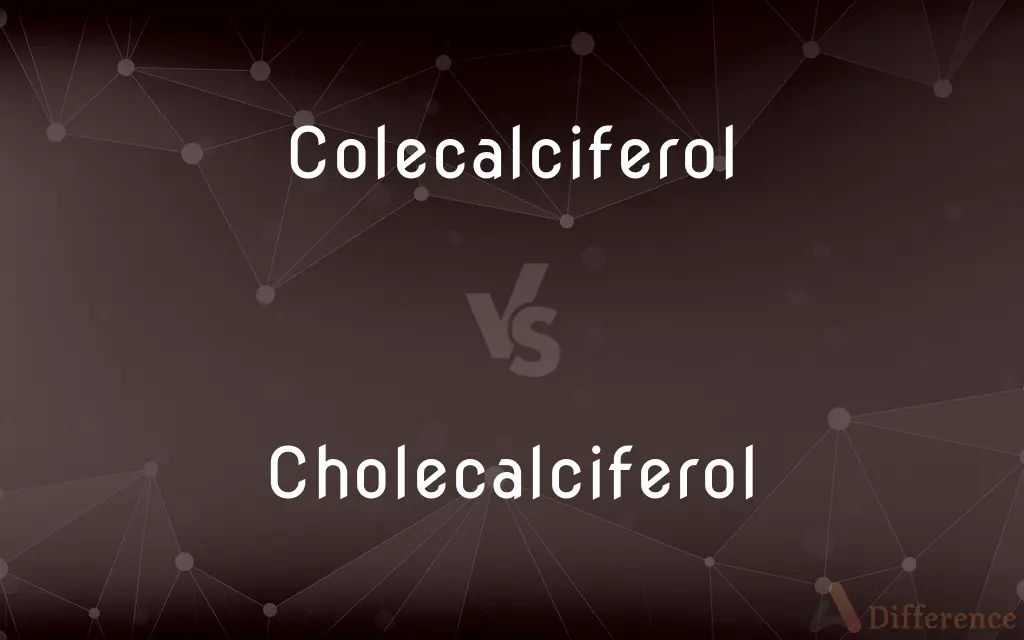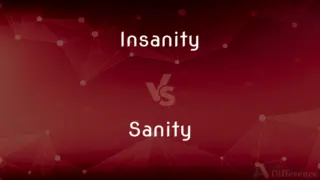Colecalciferol vs. Cholecalciferol — What's the Difference?
By Tayyaba Rehman & Fiza Rafique — Updated on April 5, 2024
Colecalciferol and cholecalciferol refer to the same substance, Vitamin D3, essential for bone health and immune function.

Difference Between Colecalciferol and Cholecalciferol
Table of Contents
ADVERTISEMENT
Key Differences
Colecalciferol and cholecalciferol are two terms that actually refer to the same chemical compound, also known as Vitamin D3. This might lead to confusion, but the discrepancy in naming is often due to variations in spelling preferences or typographical errors rather than indicating different substances.
Cholecalciferol, the correct term, is a form of Vitamin D that is synthesized by the skin when exposed to sunlight and can also be obtained through dietary supplements and certain foods. It plays a crucial role in calcium and phosphorus absorption, making it vital for maintaining healthy bones and teeth. Conversely, "colecalciferol" is less commonly used and might appear in varied contexts but essentially refers to the same Vitamin D3.
Vitamin D3's importance in the body extends beyond bone health. It is also crucial for immune system function, muscle health, and reducing inflammation. Cholecalciferol is often recommended as a dietary supplement to ensure adequate Vitamin D levels, especially in individuals with limited sun exposure or dietary intake.
In terms of availability, cholecalciferol can be found in foods such as fatty fish, egg yolks, and fortified products like milk and cereal. Supplements are also widely available for those who need to boost their Vitamin D intake. The dosage of cholecalciferol supplements varies based on age, health status, and exposure to sunlight.
The distinction between "colecalciferol" and "cholecalciferol" is largely semantic, with the latter being the accurate term for Vitamin D3. Regardless of the spelling, the significance of maintaining sufficient levels of this vitamin cannot be overstated due to its multifaceted roles in health and well-being.
ADVERTISEMENT
Comparison Chart
Correct Term
Incorrect/alternative spelling.
Correct spelling for Vitamin D3.
Substance
Refers to Vitamin D3.
Vitamin D3, essential for bone health and immune function.
Sources
Sunlight exposure, diet, supplements.
Sunlight, fatty fish, egg yolks, fortified foods, supplements.
Health Benefits
Supports bone health, muscle function, and immune system.
Crucial for calcium absorption, bone health, and immunity.
Usage
Less commonly used, might appear due to typographical error.
Widely used in medical, nutritional contexts.
Compare with Definitions
Colecalciferol
Alternative Spelling.
Colecalciferol is sometimes used in texts as an alternative spelling for cholecalciferol.
Cholecalciferol
Sunlight Synthesis.
The skin produces cholecalciferol when exposed to sunlight.
Colecalciferol
Health Importance.
Adequate levels of colecalciferol are crucial for immune function and bone health.
Cholecalciferol
Bone and Immune Health.
Cholecalciferol supports bone density and immune system health.
Colecalciferol
Vitamin D3.
Colecalciferol, also known as Vitamin D3, is essential for maintaining healthy bones.
Cholecalciferol
Dietary Sources.
Fatty fish and fortified milk are excellent sources of cholecalciferol.
Colecalciferol
Sources.
Exposure to sunlight helps the body synthesize colecalciferol naturally.
Cholecalciferol
Supplemental Use.
Cholecalciferol supplements are recommended for those at risk of deficiency.
Colecalciferol
Supplementation.
Colecalciferol supplements can help individuals who lack sufficient sun exposure.
Cholecalciferol
Vitamin D3.
Cholecalciferol plays a key role in calcium and phosphorus metabolism.
Colecalciferol
(pharmaceutical drug) The international nonproprietary name of cholecalciferol when used as a drug.
Cholecalciferol
Cholecalciferol, also known as vitamin D3 and colecalciferol, is a type of vitamin D that is made by the skin when exposed to sunlight; it is found in some foods and can be taken as a dietary supplement.Cholecalciferol is made in the skin following UVB light exposure. It is converted in the liver to calcifediol (25-hydroxyvitamin D) which is then converted in the kidney to calcitriol (1,25-dihydroxyvitamin D).
Cholecalciferol
See vitamin D3.
Cholecalciferol
Vitamin D3
Common Curiosities
Are colecalciferol and cholecalciferol the same?
Yes, they refer to the same substance, Vitamin D3, though cholecalciferol is the correct spelling.
How is cholecalciferol obtained?
It is synthesized by the skin from sunlight and can be obtained from dietary sources and supplements.
Can cholecalciferol be synthesized without sunlight?
No, sunlight exposure is essential for the skin to synthesize cholecalciferol, though it can also be obtained through diet and supplements.
What are the benefits of cholecalciferol?
It aids in calcium absorption, supports bone health, muscle function, and immune system health.
What is cholecalciferol?
Cholecalciferol is Vitamin D3, important for bone health and immune function.
Who needs cholecalciferol supplements?
Individuals with limited sun exposure, dietary intake, or specific health conditions may require supplements.
How do I know if I need more cholecalciferol?
Symptoms of deficiency and blood tests can determine if you need more cholecalciferol.
Can cholecalciferol help with depression?
Some studies suggest that adequate vitamin D levels may be linked to improved mood, but more research is needed.
What foods are rich in cholecalciferol?
Fatty fish, egg yolks, and fortified foods like milk and cereal are good sources.
Can cholecalciferol improve muscle function?
Yes, adequate levels of cholecalciferol are important for muscle strength and function.
Is there a difference between vitamin D2 and cholecalciferol?
Yes, vitamin D2 (ergocalciferol) is plant-derived, while cholecalciferol (Vitamin D3) is animal-derived and synthesized by the skin.
Is cholecalciferol safe for everyone?
While generally safe, excessive intake can lead to toxicity; it's important to follow recommended dosages.
How does cholecalciferol affect the immune system?
It plays a role in immune regulation and can help enhance the body's defense mechanisms.
What are the signs of cholecalciferol toxicity?
Symptoms of toxicity include nausea, vomiting, weakness, and serious complications like kidney damage.
What happens in a cholecalciferol deficiency?
Deficiency can lead to bone disorders like rickets in children and osteomalacia in adults.
Share Your Discovery

Previous Comparison
Deceitful vs. Sly
Next Comparison
Insanity vs. SanityAuthor Spotlight
Written by
Tayyaba RehmanTayyaba Rehman is a distinguished writer, currently serving as a primary contributor to askdifference.com. As a researcher in semantics and etymology, Tayyaba's passion for the complexity of languages and their distinctions has found a perfect home on the platform. Tayyaba delves into the intricacies of language, distinguishing between commonly confused words and phrases, thereby providing clarity for readers worldwide.
Co-written by
Fiza RafiqueFiza Rafique is a skilled content writer at AskDifference.com, where she meticulously refines and enhances written pieces. Drawing from her vast editorial expertise, Fiza ensures clarity, accuracy, and precision in every article. Passionate about language, she continually seeks to elevate the quality of content for readers worldwide.
















































